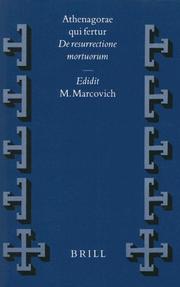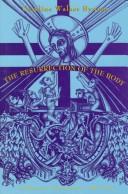| Listing 1 - 10 of 21 | << page >> |
Sort by
|
Book
ISBN: 2204052043 9782204052047 Year: 1995 Volume: *1 Publisher: Paris: Cerf,
Abstract | Keywords | Export | Availability | Bookmark
 Loading...
Loading...Choose an application
- Reference Manager
- EndNote
- RefWorks (Direct export to RefWorks)
Book
ISBN: 2220022692 9782220022697 Year: 1980 Volume: 15 Publisher: [Lieu de publication inconnu]: Desclée De Brouwer,
Abstract | Keywords | Export | Availability | Bookmark
 Loading...
Loading...Choose an application
- Reference Manager
- EndNote
- RefWorks (Direct export to RefWorks)
Book
ISBN: 9789042926899 9042926899 Year: 2012 Volume: 249 Publisher: Leuven: Peeters,
Abstract | Keywords | Export | Availability | Bookmark
 Loading...
Loading...Choose an application
- Reference Manager
- EndNote
- RefWorks (Direct export to RefWorks)
Bible --- Christian dogmatics --- Academic collection --- 22.08*3 --- 236.8 --- Bijbelse theologie: themata --- Opstanding van de doden. Staat van het gelukzalig lichaam. Staat van het verdoemde lichaam --- Conferences - Meetings --- 236.8 Opstanding van de doden. Staat van het gelukzalig lichaam. Staat van het verdoemde lichaam --- 22.08*3 Bijbelse theologie: themata --- Criticism, interpretation, etc --- Congresses --- Resurrection --- Biblical teaching
Book
ISBN: 352556290X 9783525562901 Year: 1997 Volume: 83 Publisher: Göttingen: Vandenhoeck und Ruprecht,
Abstract | Keywords | Export | Availability | Bookmark
 Loading...
Loading...Choose an application
- Reference Manager
- EndNote
- RefWorks (Direct export to RefWorks)
Christian dogmatics --- Immortality. --- Soul. --- Resurrection. --- Eschatology. --- 236.8 --- Eschatology --- Immortality --- Resurrection --- Future life --- Life after death --- Immortalism --- Last things (Theology) --- Religious thought --- Theology, Doctrinal --- Opstanding van de doden. Staat van het gelukzalig lichaam. Staat van het verdoemde lichaam --- 236.8 Opstanding van de doden. Staat van het gelukzalig lichaam. Staat van het verdoemde lichaam --- Soul --- Pneuma --- Philosophical anthropology --- Theological anthropology --- Animism --- Spirit

ISSN: 0920623X ISBN: 9004118969 9004313192 9789004118966 Year: 2000 Volume: 53 Publisher: Leiden: Brill,
Abstract | Keywords | Export | Availability | Bookmark
 Loading...
Loading...Choose an application
- Reference Manager
- EndNote
- RefWorks (Direct export to RefWorks)
This monograph comprises a new critical edition of Ps.-Athenagoras De Resurrectione Mortuorum , a complete edition of Arethas’ Scholia on the treatise, and (in the Appendix) a critical edition of the extant fragments of De Resurrectione attributed to Justin Martyr. Athenagoras was a Christian apologist, who flourished in the second half of the second century CE (ca. 180). Traditionally two extant Greek works have been attributed to him: a Plea on Behalf of the Christians , probably addressed to the Roman emperors Marcus Aurelius and Commodus, and the On the Resurrection of the Dead . The attribution of the latter treatise to Athenagoras has been a matter of dispute. In his Introduction, the editor sides with those scholars denying Athenagoras’ authorship, but ascribes its date to the end of the second century. This important edition by one of the most esteemed scholars in the field complements Prof. Marcovich’s edition of Athenagoras Legatio pro Christianis (Berlin, 1989).
Resurrection --- 236.8 --- Future life --- Opstanding van de doden. Staat van het gelukzalig lichaam. Staat van het verdoemde lichaam --- 236.8 Opstanding van de doden. Staat van het gelukzalig lichaam. Staat van het verdoemde lichaam --- Early works to 1800 --- Resurrection. --- Resurrection - Early works to 1800.
Book
ISBN: 3451166089 9783451166082 Year: 1973 Volume: 91 Publisher: Freiburg: Herder,
Abstract | Keywords | Export | Availability | Bookmark
 Loading...
Loading...Choose an application
- Reference Manager
- EndNote
- RefWorks (Direct export to RefWorks)
#GGSB: Dogmatiek --- #GGSB: Eschatologie --- 236.8 --- #GROL:SEMI-236.8 --- Opstanding van de doden. Staat van het gelukzalig lichaam. Staat van het verdoemde lichaam --- 236.8 Opstanding van de doden. Staat van het gelukzalig lichaam. Staat van het verdoemde lichaam --- Dogmatiek --- Eschatologie
Book
ISBN: 3525562721 9783525562727 Year: 1991 Volume: 65 Publisher: Göttingen: Vandenhoeck und Ruprecht,
Abstract | Keywords | Export | Availability | Bookmark
 Loading...
Loading...Choose an application
- Reference Manager
- EndNote
- RefWorks (Direct export to RefWorks)
Resurrection. --- Resurrection --- Study and teaching. --- 236.8 --- -#GROL:SEMI-236.3 --- Future life --- Opstanding van de doden. Staat van het gelukzalig lichaam. Staat van het verdoemde lichaam --- Study and teaching --- 236.8 Opstanding van de doden. Staat van het gelukzalig lichaam. Staat van het verdoemde lichaam --- #GROL:SEMI-236.3 --- Resurrection - Study and teaching.

ISBN: 0231081278 023108126X 0231546084 0231515626 9780231081269 Year: 1995 Volume: new ser., no. 15 Publisher: New York (N.Y.): Columbia university press,
Abstract | Keywords | Export | Availability | Bookmark
 Loading...
Loading...Choose an application
- Reference Manager
- EndNote
- RefWorks (Direct export to RefWorks)
A classic of medieval studies, The Resurrection of the Body in Western Christianity, 200-1336 traces ideas of death and resurrection in early and medieval Christianity. Caroline Walker Bynum explores problems of the body and identity in devotional and theological literature, suggesting that medieval attitudes toward the body still shape modern notions of the individual. This expanded edition includes her 1995 article "Why All the Fuss About the Body? A Medievalist's Perspective," which takes a broader perspective on the book's themes. It also includes a new introduction that explores the context in which the book and article were written, as well as why the Middle Ages matter for how we think about the body and life after death today.
Christian dogmatics --- Resurrection --- Human body --- Résurrection --- Corps humain --- History of doctrines --- Religious aspects --- Christianity --- Histoire des doctrines --- Aspect religieux --- Christianisme --- Body, Human --- 236.8 --- -Body, Human --- -Resurrection --- -Future life --- Human beings --- Body image --- Human anatomy --- Human physiology --- Mind and body --- Opstanding van de doden. Staat van het gelukzalig lichaam. Staat van het verdoemde lichaam --- -Religious aspects --- -Christianity --- -History of doctrines --- -Opstanding van de doden. Staat van het gelukzalig lichaam. Staat van het verdoemde lichaam --- -236.8 --- 236.8 Opstanding van de doden. Staat van het gelukzalig lichaam. Staat van het verdoemde lichaam --- -236.8 Opstanding van de doden. Staat van het gelukzalig lichaam. Staat van het verdoemde lichaam --- Résurrection --- Future life --- History --- Resurrection - History of doctrines - Early church, ca 30-600 --- Resurrection - History of doctrines - Middle Ages, 600-1500. --- Body, Human - Religious aspects - Christianity - History of doctrines - Early church, ca. 30-600. --- Body, Human - Religious aspects - Christianity - History of doctrines - Middle Ages, 600-1500.
Book
ISSN: 00791687 ISBN: 9789004282179 9789004289543 9004282173 9004289542 Year: 2015 Volume: v 140 Publisher: Leiden: Brill,
Abstract | Keywords | Export | Availability | Bookmark
 Loading...
Loading...Choose an application
- Reference Manager
- EndNote
- RefWorks (Direct export to RefWorks)
Plato’s Phaedo has never failed to attract the attention of philosophers and scholars. Yet the history of its reception in Antiquity has been little studied. The present volume therefore proposes to examine not only the Platonic exegetical tradition surrounding this dialogue, which culminates in the commentaries of Damascius and Olympiodorus, but also its place in the reflections of the rival Peripatetic, Stoic, and Sceptical schools. This volume thus aims to shed light on the surviving commentaries and their sources, as well as on less familiar aspects of the history of the Phaedo’s ancient reception. By doing so, it may help to clarify what ancient interpreters of Plato can and cannot offer their contemporary counterparts.
Immortality (Philosophy) --- Death. --- Immortalité (Philosophie) --- Mort --- Plato. --- Death --- Platon, --- Immortalité (Philosophie) --- Döden. --- Griechisch. --- Immortality (Philosophy). --- Latein. --- Literatur. --- Odödlighet (filosofi). --- Rezeption. --- Plato, --- Phaedo (Plato). --- Platon --- Dying --- End of life --- Life --- Terminal care --- Terminally ill --- Thanatology --- Philosophy --- Plato. - Phaedo
Book
ISBN: 2020053888 9782020053884 Year: 1980 Publisher: Paris : Seuil,
Abstract | Keywords | Export | Availability | Bookmark
 Loading...
Loading...Choose an application
- Reference Manager
- EndNote
- RefWorks (Direct export to RefWorks)
Philosophy, Fataleka (Solomon Islands people) --- Funeral rites and ceremonies, Fataleka (Solomon Islands people) --- Philosophy, Fataleka --- Fataleka (Solomon Islands people) --- Funeral customs and rites --- #SBIB:39A10 --- 392.2 --- -Philosophy, Fataleka (Solomon Islands people) --- Fataleka philosophy --- Antropologie: religie, riten, magie, hekserij --- Mensenoffers. Doden van mensen. Koppensnellers --- Philosophy, Fataleka. --- Funeral customs and rites. --- 392.2 Mensenoffers. Doden van mensen. Koppensnellers --- Fataleka (Solomon Islands people) - Funeral customs and rites
| Listing 1 - 10 of 21 | << page >> |
Sort by
|

 Search
Search Feedback
Feedback About UniCat
About UniCat  Help
Help News
News